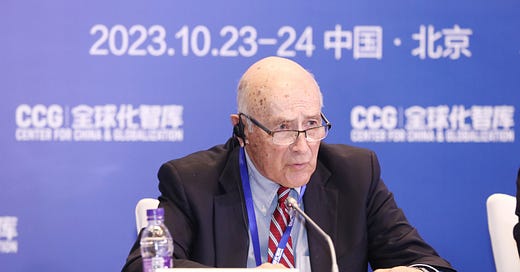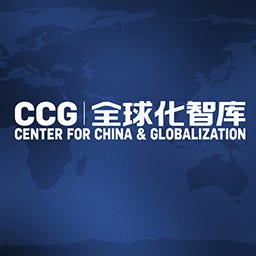Joseph Nye says China, U.S. need to "power with" rather than "power over" other countries
The father of "Soft Power" also cautions against "misleading" metaphors such as multi-polar or Cold War in a CCG forum in Beijing.
The following is the transcript of Joseph Nye's speech at the 8th China Global Think Tank Innovation Forum in Beijing on Monday, October 23, 2023. The forum is co-organized by the Center for China and Globalization (CCG) and the Chinese People's Association for Friendship with Foreign Countries (CPAFFC).
In a session moderated by Henry Huiyao Wang, the Founder and President of the CCG, the Father of Soft Power believes the current world order is not analogous to a Cold War or multipolarity, drawing on transnational interdependence and shared challenges as grounds for "power with" instead of "power over".
[BEGINS]
Thank you very much, Henry. And my congratulations to you on gathering such a distinguished group of think tanks because while we have common problems in the world, having ways to understand how each other analyzes problems is crucial. And so my congratulations to your contribution to this.
Our topic is global order, world order. Norms matter, but norms in their extent which they affect global order depend on the underlying structure of power. After the World War II, we created the United Nations, but the distribution of power in the world was bipolar between the U.S. and the Soviet Union. And that distribution of power basically paralyzed the UN in many of its functions. So we have to have a clear understanding of the distribution of power if we're going to have an understanding of our capacity to do anything about the common problems that we face. We'd all like to wish for a better world, but without an understanding of the power that underlies it, our wishes cannot be fulfilled.
Now, it's very common to talk about the world becoming multipolar. I think we confuse ourselves when we use that terminology. If one looks at the world today in terms of the distribution of power, we really should use the analogy of a three-dimensional chess game. At the top level, let's say, of military power, there's only one country which has global military power projection capabilities -and that's the U.S.
In the middle level, the middle board of economic power, the world is multipolar and has been for two decades: U.S., China, Europe, Japan, basically, these are roughly equal powers. But if you go to the third board, the bottom board of transnational relations of things that cross borders, outside the control of governments, it makes no sense at all to talk about multipolarity or bipolarity or unipolarity. This is a totally different world, and yet this is where many of our problems come from.
So how do you think about the world today? Some people say, well, the world is entering a new Cold War between the U.S. and China. You have the era of great power competition replacing the era of engagement. But I think that metaphor of the Cold War also misleads us. If you look back at the real Cold War, you'll notice that there was [inaudible] military interdependence between the U.S. and the Soviet Union, but almost no economic interdependence and very little social interaction. Whereas if you look at the relationship between the United States and China today, there's enormous economic interdependence, half $1 trillion worth of trade. And there's also social interdependence - at one point before COVID, there was something like 300,000 Chinese students studying in American universities.
But something else is interesting about the world today, which is the rise of what I call ecological interdependence, issues like pandemics and climate change, which were not major problems during the real Cold War. And therefore, we need a strategy which is much more subtle than a Cold War strategy of containment if we're going to deal with the problems we face.
Take, for example, the transnational problem of COVID, which we've all just experienced. I would argue that different countries did differently in terms of their capacity. But I think the United States and China were both failures. Each of our countries lost over a million people. And if you think about that, that's more people than have been killed in all wars in the United States behavior since 1945. So it's something which is not been handled well. And it's also something of great importance. And it's something which may come back. I mean, we may not have seen the last major pandemic. In that sense, we have to develop ways of cooperating on this. Take, for example, the fact that on the SARS epidemic, in the early 2000s, the U.S. and China cooperated very well with transnational networks of scientists who were able to share information and to stop the spread of the virus almost immediately, so the number of deaths was relatively small with thousands. And compress that with the competition between the U.S. and China on COVID, and you'll see why I regard both countries as failures.
In that sense, we have to think about how do we do two things at the same time which seem mutually contradictory, which is compete, which we're going to see in U.S.-China relationships in terms of great power issues, but cooperate at the same time to deal with these transnational threats. It's very hard for countries to encompass two contradictory thoughts at the same time. But we're going to have to learn to do it. We can't wish away the competition, but we can wish away the transnational threats.
How would you describe this situation then? At Aspen Strategy Group this summer, Secretary of State Blinken used the terminology "competitive coexistence", former Australian Prime Minister Kevin Rudd has called it "managed competition". The point that we have to learn is to think of both of these terms at the same time and not focus simply on one or the other. In that sense, if we think about competitive coexistence, we have to realize on the transnational issues, this third board of the three dimensional chess board of power that I mentioned. One has to imagine not just power over other countries, but power with other countries. These issues, the transnational issues, cannot be solved by exerting power over other countries. You have to have power with other countries.
I've given you the example of COVID where essentially the U.S. and China failed to act with each other adequately. But another equally important problem is climate change. If you think about the damage that will be done to Chinese agriculture by the drying up of the Himalayan glaciers and rivers, or you think about the damage that will be done to Miami or New York by a sea level rise of six feet. This is much larger than many wars. And yet scientists tell us that this is plausible, that it could happen. So the idea that we have to cooperate on climate change strikes me as another example of "power with" rather than "power over". There are other transnational threats that we have to think about. Proliferation, for example, of weapons of mass destruction. We've had some degree of success on nuclear non-proliferation. But we now have a new problem, which is Artificial Intelligence applied to military affairs. And this is, again, going to require some cooperation in an area where President Xi and President Biden should be in discussion, as well as the economic issues that they'll discuss when they meet at APEC in November.
So my message is that think tanks should be careful, not to be captured by historical metaphors that mislead. I would argue that multi polarity is one. I would argue that cold war is another. Instead, we have to think of how do we reconcile both competition and cooperation at the same time. Because if we fail to do that, we're going to all suffer, not just the US and China, but the world climate and the world economy. Those are my thoughts about where I think think tanks should focus.
[ENDS]
The live recording of Joseph Nye's speech
Audio
Video
At the same event, Michael Pillsbury, the “leading authority on China” according to Donald Trump, talked about the all-important One China Policy.












Joseph Nye has probably visited China often but never lived there, like I did. He does not seem to comprehend that a CCP-ruled China is not even remotely interested to share power with the US, especially in view of the fact that they view us as a rapidly declining power.
Where does he get China losing a million to covid from? China is almost 5 times larger than America lol